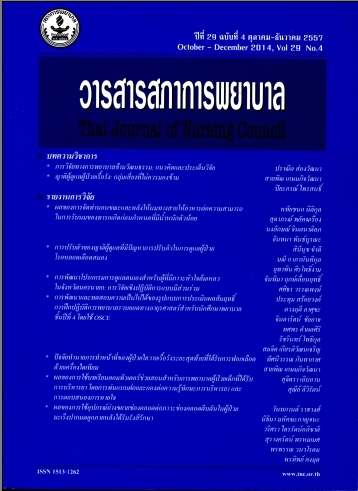การพัฒนาโปรแกรมการดูแลตนเองสำหรับผู้ที่มีภาวะหัวใจล้มเหลวในจังหวัดนครนายก: การวิจัยเชิงปฏิบัติการแบบมีส่วนร่วม
Keywords:
โปรแกรมการดูแลตนเองผู้ที่มีภาวะหัวใจล้มเหลว การวิจัยเชิงปฏิบัติการแบบมีส่วนร่วม, self-care programme, heart failure patients, participatory action researchAbstract
บทคัดย่อ: วัตถุประสงค์การวิจัย: เพื่อพัฒนาโปรแกรมการดูแลตนเองของผู้ที่มีภาวะหัวใจล้มเหลวในจังหวัดนครนายก
การออกแบบวิจัย: วิจัยเชิงปฏิบัติการแบบมีส่วนร่วม
การดำเนินการวิจัย: ผู้ให้ข้อมูลจำนวน 38 คน โดยการเลือกแบบเจาะจง ประกอบด้วยผู้ที่มีภาวะหัวใจล้มเหลว 24 คน ผู้ดูแล 6 คน พยาบาล 6 คน แพทย์ผู้เชี่ยวชาญโรคหัวใจและทรวงอก 1 คน และเภสัชกร 1 คน การดำเนินการแบ่งเป็น 2 ขั้นตอน คือ 1) พัฒนาโปรแกรมการดูแลตนเอง และ2) ประเมินผลภายหลังการทดลองใช้โปรแกรมที่พัฒนาขึ้น การเก็บข้อมูลระหว่างเดือนกุมภาพันธ์ ถึง เดือนกันยายน พ.ศ. 2556 โดยการสัมภาษณ์เชิงลึกด้วยคำถามกึ่งโครงสร้างและการสนทนากลุ่ม การวิเคราะห์ข้อมูลเชิงคุณภาพใช้การวิเคราะห์เนื้อหา
ผลการวิจัย: ในขั้นตอนที่ 1 พบว่า โปรแกรมการดูแลตนเองของผู้ที่มีภาวะหัวใจล้มเหลวที่พัฒนาขึ้น เรียกว่า โปรแกรม “LATH” ประกอบด้วย “L” หมายถึงการเรียนรู้เกี่ยวกับภาวะหัวใจล้มเหลว การดูแลตนเองที่เหมาะสม อาการและอาการแสดงที่สำคัญ รวมถึงภาวะแทรกซ้อนที่อาจเกิดขึ้น สำหรับ “A” หมายถึง การกระตุ้นให้ผู้รับบริการปฏิบัติตัวให้เหมาะสมกับโรค และเกิดความตระหนักในการปฏิบัติตัวให้ถูกต้อง “T” หมายถึง การติดตามอาการและการให้คำปรึกษาทางโทรศัพท์ และ “H” หมายถึง การเยี่ยมบ้านเพื่อการดูแลอย่างต่อเนื่องที่บ้าน ผลการศึกษาใน ขั้นตอนที่ 2 พบว่า ภายหลังการดำเนินกิจกรรมตามโปรแกรมนี้ ผู้ที่มีภาวะหัวใจล้มเหลวมีคะแนนเฉลี่ยความสามารถในการดูแลตนเองเพิ่มขึ้นอย่างมีนัยสำคัญทางสถิติ (p < .001)
ข้อเสนอแนะ: โปรแกรมการดูแลตนเองนี้ สามารถนำไปใช้ในการส่งเสริมความสามารถในการดูแลตนเองของผู้ที่มีภาวะหัวใจล้มเหลว
Abstract
Objective:To develop a self-care programme to assist heart failure patients in Nakhonnayok province.
Design: Participatory action research.
Implementation:
This study was conducted on 38 purposively sampled respondents, divided into 24 heart failure patients, 6 caregivers, 6 nurses, 1 cardiothoracic specialist and 1 pharmacist. The study was conducted in two phases. In phase 1, the self-care programme was developed. In phase 2, the programme was applied and its outcomes evaluated. Data were collected between February and September 2013 through group discussions and in-depth interviews based on semi-structured questions. The data were analysed qualitatively using the Content Analysis method.
Results:
The self-care programme developed in phase 1 was labelled ‘LATH’, in which ‘L’ stood for ‘Learning’ (about heart failure condition, its major signs and symptoms, and its potential complications), ‘A’ for ‘Activating’ (the patients to cope appropriately with the disease and to have proper behaviour), ‘T’ for ‘Telephoning’ (to follow up the patients’ conditions and to give advice), and ‘H’ for ‘Home-visiting’ (on an on-going basis to ensure proper continuing self-care practice. In phase 2, after the programme had been implemented, the heart failure patients, on average, displayed a significantly increased level of self-care ability, by p < .001.
Recommendations:
This self-care programme could be used to enable heart failure patients to take more proper care of their health.







